Let’s talk about the fascinating connection between gambling and mental health, something that affects more people than you might think. You know how sometimes our emotions drive our decisions? Well, that’s especially true when it comes to gambling. Whether you’re just picking up a scratch card at the corner store or spending evenings at the casino, your state of mind plays a huge role in those choices.
Think of it like a two-way street. Your mental health can influence how often you gamble and why you do it, while your gambling habits can seriously impact your emotional well-being. It’s kind of like a cycle that feeds into itself. Some folks might turn to gambling when they’re feeling down, hoping for that quick mood boost, while others might find their anxiety increasing after a losing streak.
What makes this relationship even more important nowadays is how incredibly easy it’s become to place a bet. Just pull out your phone, tap a few buttons, and you’re in. With mental health challenges on the rise in our always-connected world, understanding this connection isn’t just interesting, it’s crucial. After all, we’re all trying to navigate this fast-paced world while keeping our mental health in check, right?
Understanding Problem Gambling
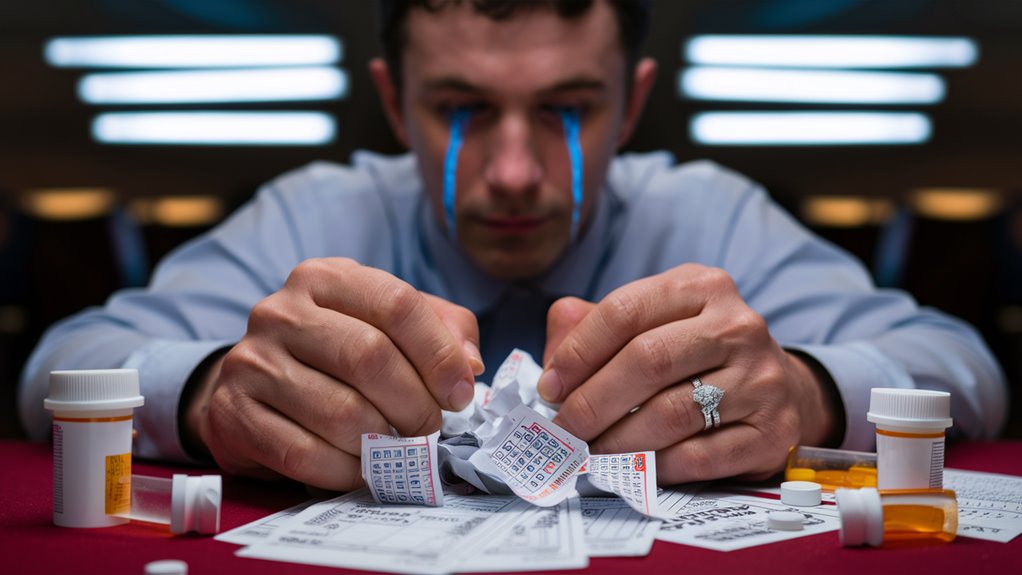
Let’s talk about problem gambling for a moment. You know how some habits can slowly take over your life? Well, gambling addiction is exactly like that, and it goes way deeper than just losing money at the casino.
Think of your brain’s reward system like a car’s engine. Just as a car needs fuel to run, your brain craves those excitement hits from gambling, similar to how drug addiction works.
Before you know it, those urges become harder to ignore, even when you’re fully aware of the consequences.
Want to know if gambling might be becoming a problem? Watch out for 슬롯먹튀사이트 these warning signs. Maybe you’ve caught yourself fibbing about how much time or money you spend gambling, or perhaps you’re dipping into your rent money hoping to win back yesterday’s losses.
If you’re constantly daydreaming about your next bet or feeling jumpy when trying to cut back, these could be red flags worth paying attention to.
Here’s the tricky part – gambling problems usually sneak up on you. It’s like slowly walking into deeper water; you mightn’t notice how deep you’re in until you’re already struggling to keep your head above the surface.
Your relationships start feeling strained, work performance might slip, and suddenly you’re using gambling to escape from stress or feeling down.
It’s a bit like a hamster wheel – the more stressed or anxious you feel, the more you might gamble, which then creates more worry and emotional turmoil.
Mental Health Risk Factors
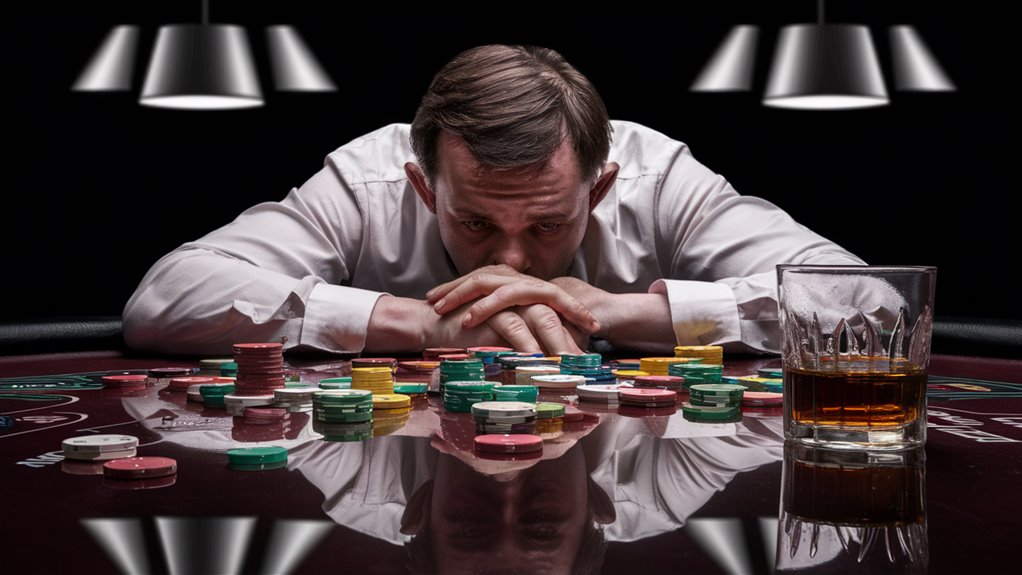
Let’s talk about how mental health and gambling problems often go hand in hand. You know how sometimes one challenge can make you more vulnerable to another? That’s exactly what happens with mental health conditions and gambling issues.
Think of depression and anxiety as potential gateway conditions. When you’re feeling down or overwhelmed, gambling might seem like an escape route, a temporary way to lift your spirits.
If you’re dealing with bipolar disorder, those intense manic phases can really cloud your judgment, making it tough to resist the urge to place “just one more bet.”
Living with ADHD brings its own challenges to the table. That rush you get from gambling? It can be extra appealing when your brain is wired to chase immediate rewards.
And if you’ve struggled with substance abuse, you might find yourself particularly drawn to gambling because both light up similar reward pathways in your brain.
Here’s something interesting about personality disorders and trauma – they can seriously impact how you handle gambling situations. Maybe you’ve noticed that when emotions run high, it’s harder to walk away from the betting table.
Or perhaps past traumatic experiences have left you searching for ways to numb difficult feelings.
Stress is another big factor to watch out for. When life gets overwhelming, gambling might feel like a pressure release valve.
And if addiction or mental health issues run in your family? Well, that’s kind of like having a loaded dice – the odds of developing gambling problems might be stacked against you.
But knowing these risk factors isn’t meant to scare you. It’s about understanding yourself better and recognizing when you might need to reach out for support. After all, awareness is your best defense against gambling problems getting out of hand.
Addiction and Brain Chemistry

Let’s talk about what really happens in your brain when gambling takes hold. You know how some people can’t seem to stop once they start? Well, there’s actually some fascinating science behind that.
Think of your brain as a chemical factory that gets seriously busy when you’re gambling. Every time 카지노사이트 먹튀검증하는법 you place a bet, your brain releases this feel-good chemical called dopamine.
And here’s the interesting part – you don’t even need to win to get that rush. Just the possibility of winning is enough to get those chemicals flowing.
Over time, though, your brain starts playing tricks on you. It’s kind of like building up a tolerance to coffee – you need more and more to get the same buzz.
Your brain’s reward system gets a bit worn out, demanding bigger bets or more frequent gambling sessions to feel that same excitement. If you’ve ever wondered why someone can’t just stop after one game, this is usually why.
The whole thing gets even trickier because your stress hormones join the party too. Cortisol levels spike whether you’re winning or losing, creating this weird emotional roller coaster.
It’s almost like your body starts craving gambling the same way it might crave comfort food when you’re stressed out. Some folks end up gambling just to feel normal or escape anxiety, but sadly, this usually makes their stress even worse.
The good news? Your brain is pretty amazing at adapting and healing. While these changes can feel permanent, they’re not set in stone.
With the right help and support, your brain can learn new patterns and break free from that gambling cycle. It’s challenging, sure, but definitely possible.
Warning Signs and Symptoms
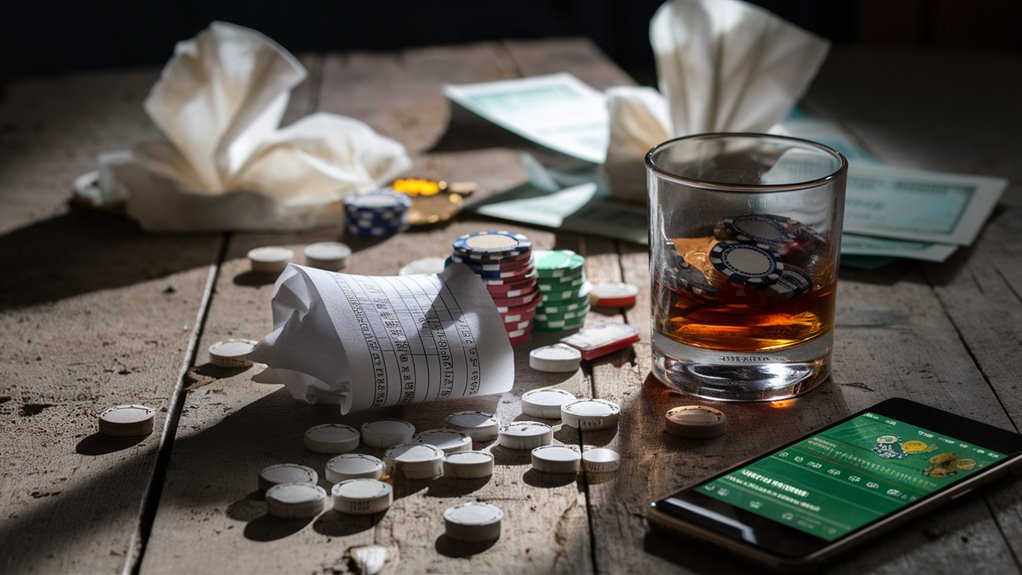
Let’s talk about how to spot gambling problems before they get out of hand.
You know how our brain chemistry changes when we develop habits? Well, these changes can actually give us early warning signs of potential gambling issues.
Have you noticed yourself constantly thinking about your next bet? Maybe you’re replaying past gambling experiences in your head or spending hours planning your next casino visit. These thought patterns are worth paying attention to.
Keep an eye on your wallet too. It starts small – maybe borrowing a few bucks here and there, or selling stuff you don’t really want to part with.
The real red flags pop up when you’re using bill money to place bets or trying to win back what you’ve lost. And if you’ve caught yourself hiding receipts or making up stories about where your money’s going, that’s definitely something to take seriously.
Your body often sends signals too. Trouble sleeping? Changes in how much you’re eating? Those persistent headaches or stomach problems mightn’t be random.
And if you’re feeling extra anxious or down, especially when you can’t gamble, that’s your body talking to you.
Watch out for changes in your daily life too. Maybe you’re skipping family events to hit the casino, calling in sick to work more often, or letting important responsibilities slide.
The good news is, catching these signs early makes a huge difference. The sooner you spot these patterns, the better your chances of getting back on track before things spiral out of control.
Impact on Personal Relationships
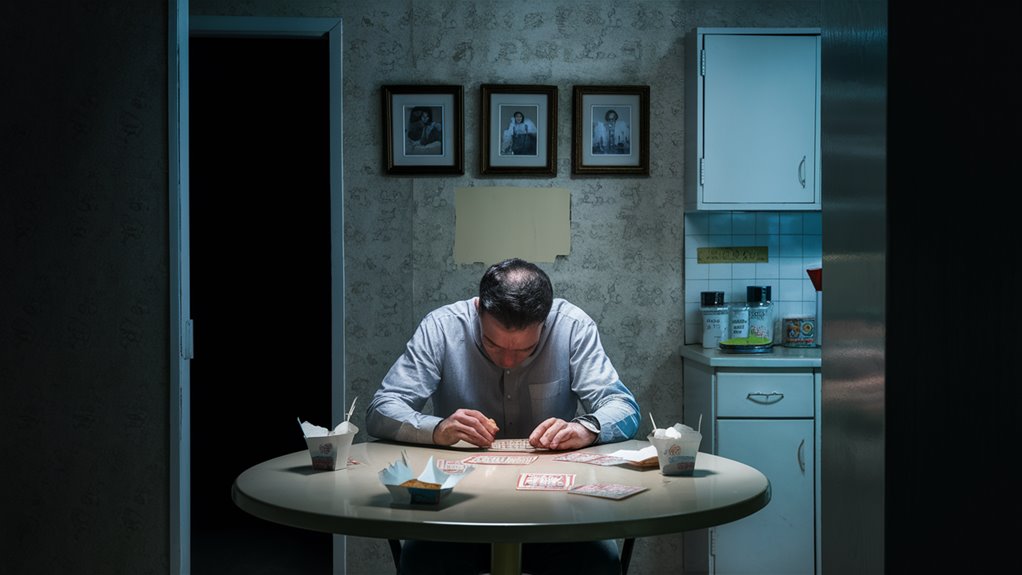
Let’s talk about how gambling can really shake up your personal life. You know how relationships are built on trust and honesty? Well, problem gambling tends to chip away at exactly those foundations.
It starts small – maybe you tell a little white lie about where you’ve been, or you borrow money without mentioning it’s for gambling. But these small deceptions have a way of snowballing.
Think about your closest relationships. Your partner might notice you’re becoming distant or irritable, especially when money comes up in conversation.
Family dinners get missed, birthday parties are skipped, and those special moments that keep families connected start slipping away. The worst part? Your kids pick up on everything. They mightn’t understand why Mom or Dad is always distracted or stressed, but they definitely feel the impact.
Your social circle takes a hit too. Remember those friends who used to call you up for weekend plans? They might stop trying after you cancel on them one too many times.
Instead, you might find yourself hanging out more with people who share your gambling habits, simply because they won’t question your choices. The tricky thing is, the guilt and embarrassment of it all can make you pull away even further.
You might catch yourself avoiding calls or making excuses not to meet up, creating this lonely cycle that’s tough to break.
Treatment Options and Support
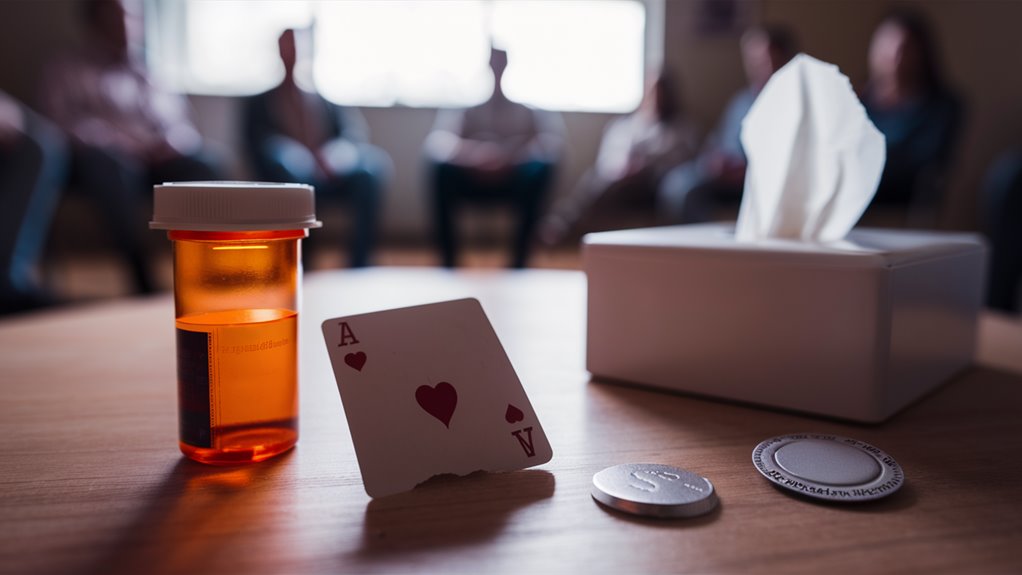
Let’s talk about getting help with gambling – it’s a big step, but you’ve got plenty of solid options to choose from. You know how sometimes we need different tools for different jobs? Well, treating gambling works the same way.
Cognitive Behavioral Therapy, or CBT for short, is one of the heavy hitters in treatment. Think of it as a mental workout where you team up with a therapist to spot those tricky thought patterns that push you toward gambling.
They’ll help you build up new ways to handle stress and urges, kind of like creating a new playbook for life’s challenges.
Support groups can be a real game-changer too. Groups like Gamblers Anonymous connect you with people who really get what you’re going through.
It’s pretty amazing to sit in a room with others who understand exactly what you’re facing and can share what worked for them. A lot of folks find that mixing professional therapy with group support gives them the best shot at recovery.
For those dealing with more intense gambling issues, residential treatment programs might be the way to go. It’s like a reset button, giving you time to focus completely on recovery.
These programs usually pack in everything from one-on-one counseling to practical stuff like sorting out your finances.
There are some really practical tools you can use too. Want to make gambling harder to access? You can put blocking software on your phone and computer, or sign up for casino self-exclusion lists.
And hey, if you’re feeling overwhelmed about where to start, your doctor can help figure out which mix of treatments makes the most sense for you. Remember, everyone’s path to recovery looks a bit different, and that’s totally okay.
Prevention Strategies

Let’s talk about stopping gambling problems before they start. You know how they say prevention is better than cure? Well, that’s especially true when it comes to gambling. The key is catching those early warning signs and setting up some solid ground rules before things get out of hand.
Think of gambling limits like a budget for a night out. Before you head to a casino or open that betting app, decide exactly how much time and money you’re willing to spend – and stick to it, no matter what.
If you’re worried about temptation, there’s some pretty good blocking software out there that can keep those gambling sites off your phone and computer.
Here’s something a lot of people overlook: your social circle makes a huge difference. Try hanging out with friends who aren’t into gambling.
Maybe join that local soccer team you’ve been thinking about, pick up photography, or volunteer at the animal shelter. Trust me, these activities can give you the same rush without risking your savings.
Understanding what pushes your gambling buttons is super important. Do you reach for your betting app when work gets stressful? Or maybe when you’re feeling lonely?
It’s worth figuring out healthier ways to deal with these feelings. Hit the gym, try meditation, or chat with a counselor. And if addiction runs in your family, you’ll need to be extra careful.
Digital Age Gambling Challenges
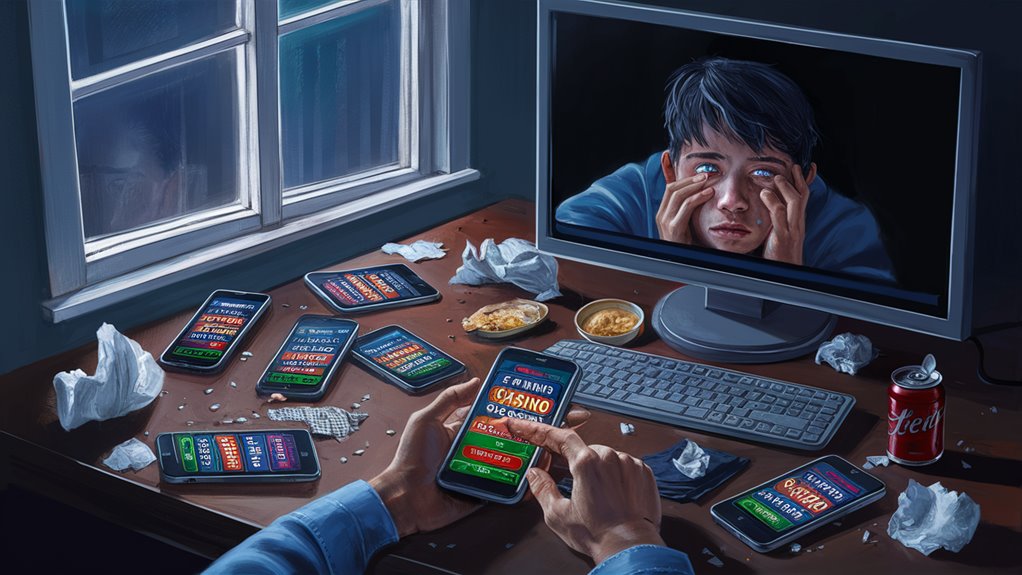
Let’s talk about how gambling has changed in our digital world. You know how everything’s just a click away these days? Well, that includes gambling too.
From sports betting apps to virtual slot machines, the opportunities to place a bet are practically endless, and they’re available right in your pocket 24/7.
What really makes online gambling tricky is how it’s wrapped up in modern tech. Think about it – you’re scrolling through social media, and suddenly there’s an ad for a betting site that knows exactly what sports you like.
These platforms are pretty clever, too. They’ll send you personalized bonus offers and “free” plays that can be hard to resist, kind of like that one friend who always knows how to convince you to stay out for just one more drink.
The thing about gambling online is that it’s so… private. Unlike walking into a casino where your friends might spot you, you can bet in complete secrecy from your couch.
And paying? Well, that’s super easy nowadays. With digital wallets and cryptocurrencies, spending money feels almost like playing with virtual coins in a video game.
Speaking of games, have you noticed how many regular video games now include elements that look suspiciously like gambling? Those loot boxes and random rewards? They’re basically training wheels for betting behaviors, especially for younger players who mightn’t even realize what’s happening.
The scary part is how natural it all feels. You might start with a casual sports bet here and there, but these platforms are designed to keep you coming back for more.
It’s like having a casino in your pocket that knows your name, your preferences, and exactly when you’re most likely to play.
Common Questions
Can Gambling Addiction Be Inherited Through Family Genetics?
Ever wondered if gambling problems run in families? Well, the science suggests there’s something to that. You know how some families seem to share certain traits, like a quick temper or anxiety? Turns out, the same might be true for gambling tendencies.
Research has shown that your family history can play a pretty big role in how likely you are to develop gambling issues. It’s not just about watching and learning behaviors from relatives, though that’s part of it. There’s actually a genetic component that can make some people more vulnerable to addictive patterns and struggling with impulse control.
Think of it like inheriting your dad’s sweet tooth or your mom’s tendency to worry. While having relatives with gambling problems doesn’t guarantee you’ll face the same challenges, it does mean you might want to be more mindful about your gambling habits. Just like someone with a family history of heart disease might watch their diet more carefully, knowing about this genetic link can help you make more informed choices about your relationship with gambling.
How Long Does It Typically Take to Recover From Gambling Addiction?
Let’s be honest – recovering from gambling addiction isn’t a quick fix. Think of it like rebuilding a house after a storm. The initial repairs might take 3-12 months of focused work, but making that house truly feel like home again? That’s a longer journey.
During those first few months, you’ll probably need pretty intensive treatment. This could mean regular therapy sessions, support group meetings, and learning new ways to handle your finances and triggers. But here’s the thing – real, lasting recovery often stretches well beyond that first year.
You know how breaking any habit takes time? Well, gambling addiction is especially tricky because those urges can pop up when you least expect them. That’s why having a solid support system isn’t just helpful – it’s absolutely crucial. Whether it’s family, friends, counselors, or support groups, these people will be your anchors during both the tough days and the victories.
Just remember, everyone’s recovery timeline looks different. Some folks might feel stronger after six months, while others need a couple of years to really find their footing. And that’s perfectly okay. What matters most is taking those steps forward, no matter how small they might seem.
Do Certain Careers Put People at Higher Risk for Gambling Problems?
Let’s talk about careers and gambling risks – it’s something that doesn’t get enough attention. You know how certain jobs can affect our habits and behaviors? Well, some professions actually put people at a higher risk for developing gambling problems.
Take the finance industry, for instance. When you’re constantly dealing with money and high-stakes decisions, it can blur the lines between calculated risks and problematic gambling. Sales professionals face similar challenges, especially since their income often fluctuates with commission-based work.
The hospitality sector is another interesting case. If you’re working at a casino or around gambling venues, you’re naturally more exposed to betting opportunities. Those late-night shifts and irregular hours can make it tempting to unwind with a quick game or bet.
Professional athletes and sports industry workers face unique pressures too. They’re immersed in a world where betting odds and gambling discussions are part of daily conversation. Plus, the competitive nature of their work can spill over into other areas of life.
What makes these jobs particularly risky? It’s usually a perfect storm of factors: high stress levels, easy access to cash, irregular working hours, and frequent exposure to gambling opportunities. Think about it – when you’re stressed from a long shift and have ready access to betting platforms, it’s easier to slip into problematic patterns.
What Percentage of Problem Gamblers Successfully Achieve Long-Term Recovery?
Let’s talk about recovery rates for problem gambling, because the numbers tell an interesting story. You know how everyone’s journey is different? Well, research shows that somewhere between 35% and 50% of people struggling with gambling addiction successfully maintain their recovery for the long haul.
But here’s the thing – success really depends on several key factors. Think of recovery like building a house: you need the right tools (treatment programs), a solid foundation (support system), and the determination to see it through (personal commitment). Some people might find success through intensive therapy, while others thrive in support groups or with family-based approaches.
The path isn’t always straightforward, and what works for one person might not work for another. Some folks bounce back after their first attempt at recovery, while others may need multiple tries before finding their footing. That’s perfectly normal, by the way. Recovery is rarely a straight line from point A to point B.
The good news? These numbers suggest that meaningful, lasting change is absolutely possible. When people find the right combination of professional help, personal dedication, and ongoing support, their chances of maintaining recovery can significantly improve.
Are Women and Men Affected Differently by Gambling Addiction?
Let me break down something interesting about gambling addiction. You know how men and women often approach things differently? Well, the same goes for gambling patterns. Guys tend to jump in earlier and get hooked more quickly, often drawn to the thrill of sports betting and poker tables. Women, on the other hand, usually start their gambling journey later in life and gravitate toward different games. You’ll typically find them enjoying slots or settling in for a night of bingo with friends.
Think of it like this – while a young man might be placing bets on Sunday football games with his buddies, his mom or aunt might not discover their interest in gambling until they’re in their 40s or 50s, maybe during a casual casino trip with friends. And when they do gamble, they’re more likely to be sitting at the slot machines, watching those colorful reels spin, rather than hanging out at the sportsbook.

